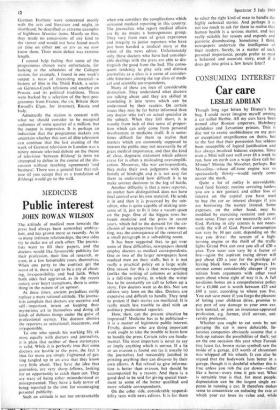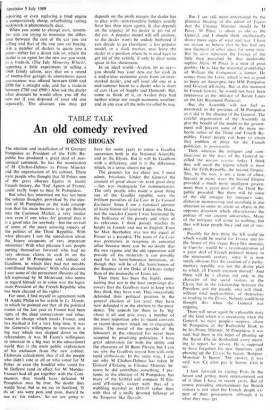CONSUMING INTEREST
Car care
LESLIE ADRIAN
Though long ago bitten by Disney's love bug, I could never imagine myself owning a car called Herbie. All my cars have been named after Roman emperors, Habsburg archdukes and Levantine princes. This is due not to exotic snobbishness on my part or exceptional magnificence on theirs, but to the fact that their possession has seldom been susceptible of logical justification and has always involved hideous expense. Since even a Mini will cost well over £6 a week to run, how on earth can a wage slave call her Minnie? Minnie the Moocher, perhaps. But Messalina—whose off-tune engine was so spectacularly thirsty—would surely come nearer the mark.
Quite a lot of outlay is unavoidable; road fund licence; routine servicing (unless you are a DIY genius); and either loss of interest on the capital you have used to buy the car or interest charges if you are borrowing the money instead. Some expenses, on the other hand, may be modified by exercising restraint and com- mon sense. Fines are not necessarily acts of God. Parking in city centres is not neces- sarily the will of God. Petrol consumption can vary by 10 per cent, depending on the way you drive: the scream of a high- revving engine or the thrill of the traffic lights Grand Prix can cost you all of £20 a year. Tyre wear can vary by a factor of five—again the aspirant racing driver will pay about £20 a year for the privilege of leaving black lines on HM's highways. In- surance comes considerably cheaper if you refrain from arguments with other road users about whose right of way it is. A full no-claims bonus on a comprehensive policy for a £1,000 car is worth between £25 and £60 a year, according to where you live. You can save more if you forgo the pleasure of letting your children drive, promise to pay part of any damage to your own car. turn teetotal, or join an insurance-approved profession, e.g. farmer, civil servant, uni- versity professor.
Whether you ought to cut costs by not garaging the car is more debatable. In- surance companies obviously assume that a lock-up reduces the possibilities of theft; yet on the one occasion this year when Farouk (my latest fat, brown status symbol) saw the inside of a garage. £15 worth of chromium was whipped off his wheels. It can also be argued that the bodywork lasts better in a garage, though it is doubtful whether this is true unless you rub the car down—rather like a horse—every time it gets wet. What is certainly true is that, for most people, depreciation can be the largest single ex- pense in running a car. It therefore makes sense to concentrate on reducing the rate at which your car loses its value and. while repairing or even replacing a tired engine is comparatively cheap, refurbishing rotting bodywork is phenomenally dear.
When you come to change cars, remem- ber you are trying to minimise the differ- ence between the cost of the car you are selling and that of the one you are buying. Ask a number of dealers to quote you a price—either for a direct sale or, where the dealer is an agent for the new car you want, as a trade-in. (The July Motoring Which?, reporting a little experiment in selling a 1968 family saloon, says that on a round of twenty-five garages its anonymous agent provocateur was offered between £660 and £850 for a straight sale, and for a trade-in between £780 and £900.) Also ask the dealer what discount he would allow you off the new car if you disposed of your old one separately. The discount you may get
depends on the profit margin the dealer has to play with—non-franchise holders usually have less than main agents. It also depends on the urgency of his desire to get rid of the car. A popular model will sell anyhow, so the dealer won't be unduly bothered if you decide to go elsewhere; a less popular model, or a slack market, may leave the dealer in a position where he is mad keen to get rid of the vehicle. if only to clear some space in his showroom.
In an ideal world—Avalon, let us say— you should buy your new car for cash in a mid-winter economic crisis from an over- stocked dealer, and sell your old one in a mid-summer boom to a dealer who is short of cars (Law of Supply and Demand). But, come to think of it, in Avalon they had neither winter nor rough economic weather; and in any case all the nobs travelled by nag.



































 Previous page
Previous page